Global Markets Tumble: Nikkei Drops 5.8% After Wall Street Retreat
By Rediff Money Desk, Bangkok Aug 02, 2024 13:53
World stocks plunged Friday, led by a 5.8% drop in Tokyo's Nikkei 225 index after a tech-driven retreat on Wall Street. Concerns over US economic weakness and the Fed's interest rate policy fueled market anxieties.
Bangkok, Aug 2 (AP) World shares tumbled Friday, with Japan's Nikkei 225 index slumping 5.8 per cent as investors panicked over signs of weakness in the US economy.
The declines followed a retreat on Wall Street after weak data raised worries the Federal Reserve may have missed its window to lower interest rates before they undercut economic growth. Fed Chair Jerome Powell said a cut could come in September after the US central bank held steady at a meeting this week.
The short-lived satisfaction of Fed Chief Powell communicating decent odds of a September rate cut has turned sour as investors are now panicking that the central bank isn't trimming soon enough, José Torres, a senior economist at Interactive Brokers, said in a report.
Bracing for a highly anticipated employment report coming on Friday, the future for the S&P 500 was down 0.9 per cent, while that for the Dow Jones Industrial Average lost 0.5 per cent.
A nearly 19 per cent decline in Intel's shares in aftermarket trading deepened the gloom. The chipmaker said it was cutting 15 per cent of its massive workforce about 15,000 jobs to better compete with more successful rivals like Nvidia and AMD.
In early European trading, Germany's DAX shed 1.4 per cent to 17,834.67, while the CAC 40 slipped 0.7 per cent to 7,315.93. In London, the FTSE 100 fell 0.4 per cent to 8,245.92.
Japan's market retreated to where it was trading in January before surging to an all-time high last month of over 42,000. The Nikkei 225 lost 2,216.63 points to 35,909.70, with banks', technology-related and manufacturers' shares hit by heavy selling.
The Nikkei has lost 6.2 per cent in the past three months.
Japanese shares were pummelled after the central bank raised its benchmark interest rate on Wednesday, to 0.25 per cent from 0.1 per cent. That pushed the value of the Japanese yen higher against the US dollar, potentially hurting overseas earnings of major manufacturers and deflating a boom in tourism.
The dollar fell to 148.99 yen early Friday from 149.37 yen late Thursday. It had recently traded above 160 yen. The euro rose to USD 1.0803 from USD 1.0789.
Elsewhere in Asia on Friday, Hang Seng in Hong Kong dropped 2.1 per cent to 16,950.46, while the Shanghai Composite index saw a more modest loss, of 0.9 per cent to 2,905.34.
Chinese shares have extended losses as investors registered disappointment with the government's latest efforts to spur growth through various piecemeal measures instead of the hoped-for infusions of broader stimulus.
The Kospi in Seoul dropped 3.7 per cent to 2,676.19 and Taiwan's Taiex sank 4.4 per cent. Both markets tend to be hit hard by weakness in technology shares.
South Korea's Samsung Electronics dropped 4.2 per cent while another maker of computer chips and other components, SK Hynix, dropped 10.4 per cent. Taiwan Semiconductor Manufacturing Co., the world's largest chip maker, lost 5.9 per cent.
Elsewhere in Asia, Australia's S&P/ASX gave up 2.1 per cent to 7,943.20 and the Sensex in India was down 0.9 per cent. Bangkok's SET fell 0.9 per cent.
It has been a nerve wracking week for markets even as central banks in Japan, the United States and England followed through much as expected. Japan raised its benchmark, the Fed stood pat, and the Bank of England lowered its key rate by 0.25 per cent, to 5 per cent, its first cut in more than four years.
Commodity prices have also had a rough ride, with oil prices surging after the killings of leaders of Hamas and Hezbollah that fuelled fears conflict in the Middle East might escalate into a wider war. But prices fell back Thursday and were only marginally higher early Friday.
Benchmark US crude oil gained 79 cents to USD 77.10 per barrel. Brent crude, the international standard, was up 76 cents at USD 80.28 per barrel.
The price of gold, a traditional refuge for investors in uncertain times, surged to over USD 2,500 an ounce.
Meanwhile, other commodities sank on concerns that weakness in the US and other major economies will hurt demand. The price of nickel dropped 2.4 per cent, aluminum dropped 1 per cent and copper was down 0.2 per cent.
Worry is mounting that the Fed may have kept its main interest rate at a two-decade high for too long in its zeal to stifle inflation by making it more costly to borrow. It could take months to a year for a rate cut to filter through the economy.
On Thursday, the S&P 500 sank 1.4 per cent after a report from the Institute for Supply Management showed US manufacturing activity is still shrinking. The Dow fell 1.2 per cent, and the Nasdaq composite dropped 2.3 per cent. The small stocks in the Russell 2000 index dropped 3 per cent.
Other reports Thursday showed the number of US workers applying for jobless benefits hit its highest level in about a year and that productivity for US workers improved in the spring. The data are likely to relieve pressure on inflation and give the Fed more leeway to cut rates.
Employment growth appears to be slowing more than expected, Philip Marey, senior US strategist for Rabobank, said in a commentary.
This suggests that the Fed's strategy to bring better balance between labour demand and supply through restrictive interest rates is working, but of course the risk is that employment growth is brought to a halt and the economy slides into a recession. (AP)
The declines followed a retreat on Wall Street after weak data raised worries the Federal Reserve may have missed its window to lower interest rates before they undercut economic growth. Fed Chair Jerome Powell said a cut could come in September after the US central bank held steady at a meeting this week.
The short-lived satisfaction of Fed Chief Powell communicating decent odds of a September rate cut has turned sour as investors are now panicking that the central bank isn't trimming soon enough, José Torres, a senior economist at Interactive Brokers, said in a report.
Bracing for a highly anticipated employment report coming on Friday, the future for the S&P 500 was down 0.9 per cent, while that for the Dow Jones Industrial Average lost 0.5 per cent.
A nearly 19 per cent decline in Intel's shares in aftermarket trading deepened the gloom. The chipmaker said it was cutting 15 per cent of its massive workforce about 15,000 jobs to better compete with more successful rivals like Nvidia and AMD.
In early European trading, Germany's DAX shed 1.4 per cent to 17,834.67, while the CAC 40 slipped 0.7 per cent to 7,315.93. In London, the FTSE 100 fell 0.4 per cent to 8,245.92.
Japan's market retreated to where it was trading in January before surging to an all-time high last month of over 42,000. The Nikkei 225 lost 2,216.63 points to 35,909.70, with banks', technology-related and manufacturers' shares hit by heavy selling.
The Nikkei has lost 6.2 per cent in the past three months.
Japanese shares were pummelled after the central bank raised its benchmark interest rate on Wednesday, to 0.25 per cent from 0.1 per cent. That pushed the value of the Japanese yen higher against the US dollar, potentially hurting overseas earnings of major manufacturers and deflating a boom in tourism.
The dollar fell to 148.99 yen early Friday from 149.37 yen late Thursday. It had recently traded above 160 yen. The euro rose to USD 1.0803 from USD 1.0789.
Elsewhere in Asia on Friday, Hang Seng in Hong Kong dropped 2.1 per cent to 16,950.46, while the Shanghai Composite index saw a more modest loss, of 0.9 per cent to 2,905.34.
Chinese shares have extended losses as investors registered disappointment with the government's latest efforts to spur growth through various piecemeal measures instead of the hoped-for infusions of broader stimulus.
The Kospi in Seoul dropped 3.7 per cent to 2,676.19 and Taiwan's Taiex sank 4.4 per cent. Both markets tend to be hit hard by weakness in technology shares.
South Korea's Samsung Electronics dropped 4.2 per cent while another maker of computer chips and other components, SK Hynix, dropped 10.4 per cent. Taiwan Semiconductor Manufacturing Co., the world's largest chip maker, lost 5.9 per cent.
Elsewhere in Asia, Australia's S&P/ASX gave up 2.1 per cent to 7,943.20 and the Sensex in India was down 0.9 per cent. Bangkok's SET fell 0.9 per cent.
It has been a nerve wracking week for markets even as central banks in Japan, the United States and England followed through much as expected. Japan raised its benchmark, the Fed stood pat, and the Bank of England lowered its key rate by 0.25 per cent, to 5 per cent, its first cut in more than four years.
Commodity prices have also had a rough ride, with oil prices surging after the killings of leaders of Hamas and Hezbollah that fuelled fears conflict in the Middle East might escalate into a wider war. But prices fell back Thursday and were only marginally higher early Friday.
Benchmark US crude oil gained 79 cents to USD 77.10 per barrel. Brent crude, the international standard, was up 76 cents at USD 80.28 per barrel.
The price of gold, a traditional refuge for investors in uncertain times, surged to over USD 2,500 an ounce.
Meanwhile, other commodities sank on concerns that weakness in the US and other major economies will hurt demand. The price of nickel dropped 2.4 per cent, aluminum dropped 1 per cent and copper was down 0.2 per cent.
Worry is mounting that the Fed may have kept its main interest rate at a two-decade high for too long in its zeal to stifle inflation by making it more costly to borrow. It could take months to a year for a rate cut to filter through the economy.
On Thursday, the S&P 500 sank 1.4 per cent after a report from the Institute for Supply Management showed US manufacturing activity is still shrinking. The Dow fell 1.2 per cent, and the Nasdaq composite dropped 2.3 per cent. The small stocks in the Russell 2000 index dropped 3 per cent.
Other reports Thursday showed the number of US workers applying for jobless benefits hit its highest level in about a year and that productivity for US workers improved in the spring. The data are likely to relieve pressure on inflation and give the Fed more leeway to cut rates.
Employment growth appears to be slowing more than expected, Philip Marey, senior US strategist for Rabobank, said in a commentary.
This suggests that the Fed's strategy to bring better balance between labour demand and supply through restrictive interest rates is working, but of course the risk is that employment growth is brought to a halt and the economy slides into a recession. (AP)
Source: ASSOCIATED PRESS
DISCLAIMER - This article is from a syndicated feed. The original source is responsible for accuracy, views & content ownership. Views expressed may not reflect those of rediff.com India Limited.
You May Like To Read
TODAY'S MOST TRADED COMPANIES
- Company Name
- Price
- Volume
- Vodafone Idea L
- 15.87 (+ 0.95)
- 60670473
- GTL Infrastructure
- 2.82 (+ 1.81)
- 59154693
- Suzlon Energy Ltd.
- 72.95 (+ 4.86)
- 19977625
- Srestha Finvest
- 2.07 ( -2.36)
- 18682919
- YES Bank Ltd.
- 23.92 ( -0.54)
- 14385929
MORE NEWS

India-South Africa Trade Revival: New...
A new initiative to boost trade relations between India and South Africa was launched,...

Kerala & TN to Attract Investments: Minister
Kerala's Industries Minister P Rajeev suggests collaboration with Tamil Nadu to attract...

Boilers Bill Introduced in Rajya Sabha for Ease...
A new Boilers Bill, replacing the century-old law, was introduced in Rajya Sabha to...



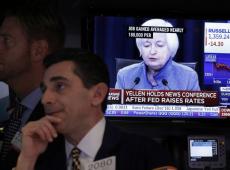

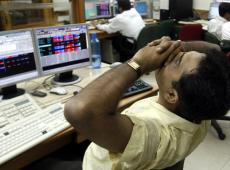


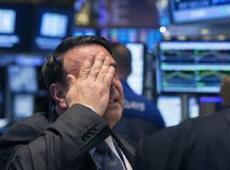
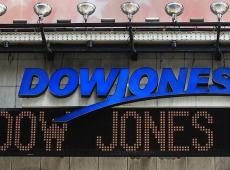
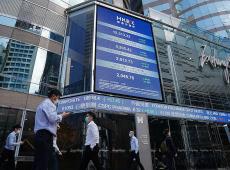
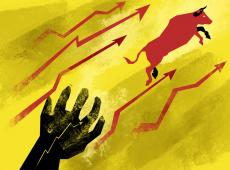
 © 2024 Rediff.com India Limited. All rights reserved.
© 2024 Rediff.com India Limited. All rights reserved.